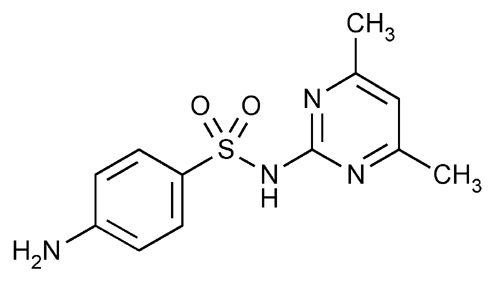Sulfamethazine
Benzenesulfonamide, 4-amino-N-(4,6-dimethyl-2-pyrimidinyl)-.
N1-(4,6-Dimethyl-2-pyrimidinyl)sulfanilamide
» Sulfamethazine contains not less than 99.0 percent and not more than 100.5 percent of C12H14N4O2S, calculated on the dried basis.
Packaging and storage—
Preserve in well-closed, light-resistant containers.
Clarity and color of solution—
Dissolve 1.0 g in a mixture of 20 mL of water and 5 mL of 1 N sodium hydroxide: the solution is clear and not more deeply colored than pale yellow.
Identification—
B:
To 0.10 g add 10 mL of water and just sufficient sodium hydroxide solution (1 in 250) to give a faint pink spot on phenolphthalein paper. Add 5 drops of cupric sulfate TS: a yellow-green precipitate is formed, and it becomes brown on standing.
Acidity—
Digest 3.0 g with 150 mL of carbon dioxide-free water at 70 for about 5 minutes, stirring occasionally to maintain suspension of the test specimen. Cool the mixture rapidly in an ice bath to 20 ± 0.5
for about 5 minutes, stirring occasionally to maintain suspension of the test specimen. Cool the mixture rapidly in an ice bath to 20 ± 0.5 , with mechanical stirring. Filter immediately, with vacuum, omitting washing of the solid but drying it thoroughly by suction. Add 2 drops of thymolphthalein TS to 25.0 mL of the filtrate, and titrate with 0.1 N sodium hydroxide VS. To a second 25.0-mL portion of the filtrate add 10 mL of hydrochloric acid. Cool the mixture to 15
, with mechanical stirring. Filter immediately, with vacuum, omitting washing of the solid but drying it thoroughly by suction. Add 2 drops of thymolphthalein TS to 25.0 mL of the filtrate, and titrate with 0.1 N sodium hydroxide VS. To a second 25.0-mL portion of the filtrate add 10 mL of hydrochloric acid. Cool the mixture to 15 , and titrate with 0.1 M sodium nitrite VS as directed under Nitrite Titration
, and titrate with 0.1 M sodium nitrite VS as directed under Nitrite Titration  451
451 : the volume of 0.1 N sodium hydroxide consumed does not exceed the volume of 0.1 M sodium nitrite consumed by more than 0.5 mL.
: the volume of 0.1 N sodium hydroxide consumed does not exceed the volume of 0.1 M sodium nitrite consumed by more than 0.5 mL.
Loss on drying  731
731 —
Dry about 1 g, accurately weighed, at 105
—
Dry about 1 g, accurately weighed, at 105 for 2 hours: it loses not more than 0.5% of its weight.
for 2 hours: it loses not more than 0.5% of its weight.
Residue on ignition  281
281 :
not more than 0.1%.
:
not more than 0.1%.
Selenium  291
291 :
0.003%, a 200-mg test specimen being used.
:
0.003%, a 200-mg test specimen being used.
Heavy metals, Method II  231
231 :
0.002%.
:
0.002%.
Ordinary impurities  466
466 —
—
Test solution:
acetone.
Standard solution:
acetone.
Eluant:
a mixture of ethyl acetate, methanol, and ammonium hydroxide (17:6:5).
Visualization:
11.
Assay—
Proceed with Sulfamethazine as directed under Nitrite Titration  451
451 . Each mL of 0.1 M sodium nitrite is equivalent to 27.83 mg of C12H14N4O2S.
. Each mL of 0.1 M sodium nitrite is equivalent to 27.83 mg of C12H14N4O2S.
Auxiliary Information—
Please check for your question in the FAQs before contacting USP.
| Topic/Question | Contact | Expert Committee |
| Monograph | Ian DeVeau, Ph.D.
Director, Veterinary Drugs and Radiopharmaceuticals 1-301-816-8178 |
(VET05) Veterinary Drugs 05 |
| Reference Standards | Lili Wang, Technical Services Scientist 1-301-816-8129 RSTech@usp.org |
USP32–NF27 Page 3624
